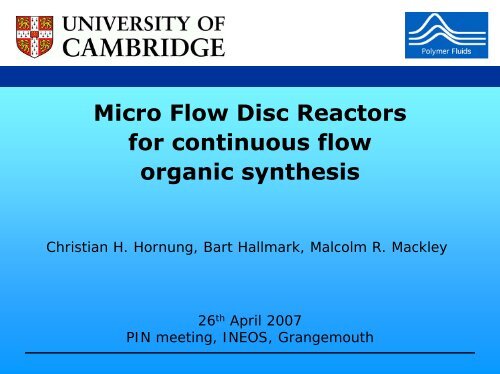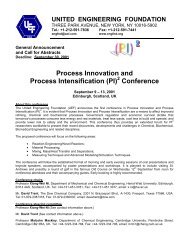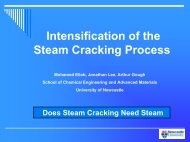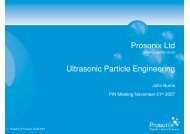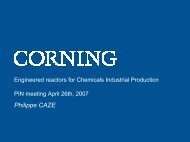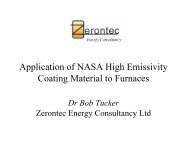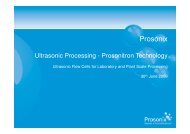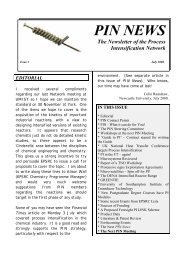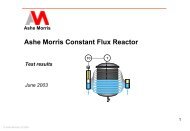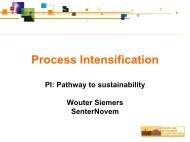Microflow Disc Reactors
Microflow Disc Reactors
Microflow Disc Reactors
You also want an ePaper? Increase the reach of your titles
YUMPU automatically turns print PDFs into web optimized ePapers that Google loves.
Micro Flow <strong>Disc</strong> <strong>Reactors</strong><br />
for continuous flow<br />
organic synthesis<br />
Christian H. Hornung, Bart Hallmark, Malcolm R. Mackley<br />
26 th April 2007<br />
PIN meeting, INEOS, Grangemouth
Microcapillary films (MCFs)<br />
Microcapillary Films (MCFs):<br />
MCFs are plastic films<br />
containing microcapillary<br />
arrays of continuous length.<br />
The capillaries have a round to<br />
elliptical shape with diameters<br />
between 30 and 500 µm. MCFs<br />
are manufactured by gasentrained<br />
polymer extrusion.<br />
500 µm<br />
2
Microcapillary flow disc (MFD)<br />
• MCF wound up to form spiral (single or double spiral)<br />
• Heat pressing (at 116 °C for LLDPE) solid compact disc<br />
• typical length: 5 – 40 m<br />
Connectors:<br />
1) epoxy resin / HPLC fitting<br />
2) cyl. MCF unit / HPLC fitting<br />
single spiral<br />
double spiral<br />
3
Microcapillary flow disc (MFD)<br />
4
Kilogram-scale reactor<br />
8 flow discs running in parallel<br />
152 capillaries / length: 40 m<br />
total: 6.1 km microchannel<br />
Q = 0.1 … 10 ml/min<br />
production of g- to<br />
kg-quantities<br />
5
Organic synthesis in flow<br />
Diels-Alder reaction<br />
Reaction conditions:<br />
Q = 2 – 6 ml/min<br />
solvent: MeCN<br />
τ = 28 - 113 min<br />
T = 60 °C<br />
2 ml/min / 113 min<br />
93 % conv.<br />
1.1 kg/day<br />
4 ml/min / 57 min<br />
93 % conv.<br />
2.2 kg/day<br />
6 ml/min / 28 min<br />
93 % conv.<br />
3.9 kg/day<br />
6
Conclusions<br />
Variable, low cost, continuous flow<br />
microreactor concepts made from MCFs<br />
Key potential features of MCFs:<br />
Flexible film of continuous length<br />
Fast heat transfer / good temperature control<br />
Optical transparency / microwaveable<br />
7
Acknowledgements<br />
Prof. Steven V. Ley †<br />
Prof. Robert P. Hesketh ‡<br />
Dr. Ian R. Baxendale †<br />
Polymer Fluids Group *<br />
ITC †<br />
EPSRC<br />
* Dept. of Chemical Engineering, Cambridge University, UK<br />
† Dept. of Chemistry, Cambridge University, UK<br />
‡ Dept. of Chemical Engineering, Rowan University, USA<br />
8
Microcapillary <strong>Reactors</strong> (MCRs)<br />
9
Fabrication of microcapillary films (MCFs)<br />
Gas-entrained polymer extrusion:<br />
polymer matrix:<br />
• linear-low-density<br />
polyethylene (LLDPE)<br />
•polypropylene(PP)<br />
• Affinity polyolefin<br />
plastomer (POP)<br />
• polyvinyl alcohol (PVA)<br />
• Santoprene thermoplastic<br />
vulcanizate (TPV)<br />
•polyurethane(PU)<br />
•polystyrene(PS)<br />
rectangular extrusion die: 13 to 1 aspect ratio<br />
gas injector with up to 19 hypodermic needles<br />
10<br />
* Hallmark et al., 2005, Advanced Engineering Materials, 7, 545-547
Microcapillary flow disc (MFD)<br />
• MCF wound up to form spiral (single or double spiral)<br />
• Heat pressing (at 116 °C for LLDPE) solid compact disc<br />
• typical length: 5 – 40 m<br />
Connectors:<br />
1) epoxy resin / HPLC fitting<br />
2) cyl. MCF unit / HPLC fitting<br />
single spiral<br />
double spiral<br />
11
Continuous flow microwave reactor<br />
• microwave synthesizer (Emrys TM Optimizer)<br />
• MCF wound around teflon microwave insert<br />
• 2 cylindrical MCF connectors<br />
• length: 4 m inside microwave cavity (+ 2x 20 cm leads)<br />
12
Continuous flow microwave reactor<br />
F<br />
F<br />
F<br />
+<br />
H<br />
N NH 2<br />
Cl<br />
- EtOH<br />
F<br />
F<br />
F<br />
H<br />
NC<br />
N N<br />
H<br />
CN<br />
µ-wave<br />
75°C<br />
F<br />
F<br />
F<br />
N H 2<br />
CN<br />
N N<br />
EtO<br />
CN<br />
Cl<br />
Cl<br />
H<br />
CN<br />
Pyrazole<br />
Reaction conditions:<br />
Q = 0.1 – 0.2 ml/min solvent: MeOH<br />
τ = 15 - 30 min T = 60 - 75 °C<br />
15 min / 60 °C<br />
39.67 % conv.<br />
15 min / 75 °C<br />
64.46 % conv.<br />
30 min / 75 °C<br />
~100 % conv.<br />
13


